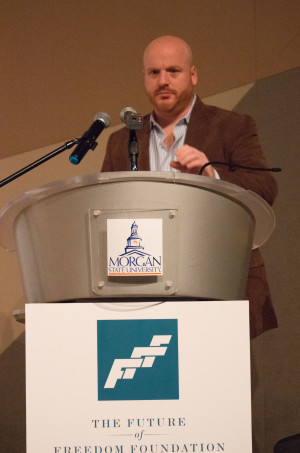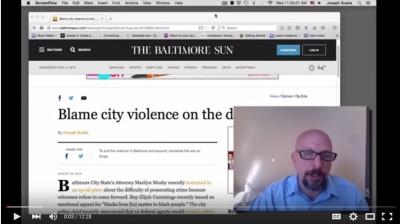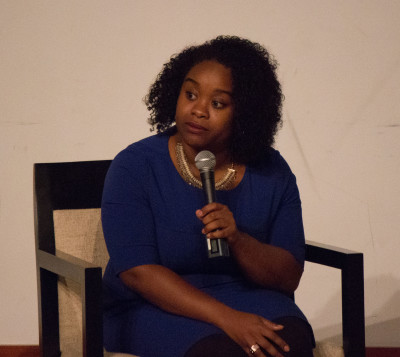Last Saturday The Future of Freedom Foundation and the Pre-Law Association on campus held a conference at Morgan State University in Baltimore, which U.S. News ranks among the top historically black universities in America. The theme of the conference was: “The Drug War Against Black America.” We had a little more than 100 people in attendance.
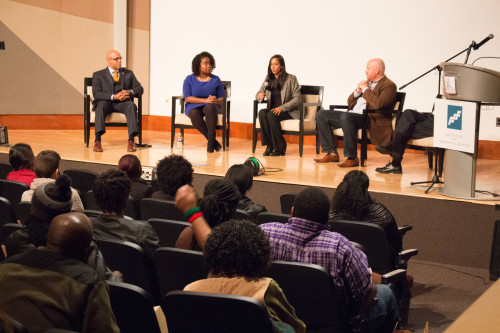
How did FFF come to have a conference at Morgan State?
I have been participating in libertarian seminars and conferences for 40 years. All those conferences have been composed of predominantly white attendees. Yet, African-Americans have borne the brunt of many welfare-warfare state programs, especially the war on drugs, whose adverse consequences, while affecting people of all colors and national origins, has fallen disproportionately on blacks.
Last spring, The Future of Freedom Foundation, in conjunction with the Young Americans for Liberty, hosted a conference at the University of Texas entitled, “Stop the Wars on Drugs and Terrorism,” which featured Ron Paul, Radley Balko, and Glenn Greenwald. More than 700 people attended. During a Q&A session, an attendee stood up and asked a pointed question: “Why are there no African Americans here?”
So, after the UT conference, I returned to my office and asked a simple question: Rather than wait for African Americans to come to our libertarian conferences, why not take our libertarian conferences to African Americans? We did some research on the Internet and discovered U.S. News’ list of historically black universities.
We began emailing professors at Morgan State University and telling them what we wanted to do. In a stroke of good fortune, I heard back from a professor at Morgan who feels as strongly as we do about what drug war has done to African Americans and why it is so important that America bring this horrible program to an end.
It turns out that that professor, whose name is Aaron Rodriquez, and who is in his 30s, is also the sponsor of the Pre-Law Association on campus. It’s a group of students who are interested in going to law school. Aaron proposed the project to the Pre-Law Association and they were ecstatic about the idea.
So, the Pre-Law Association became our co-sponsor on campus and insisted on doing most of the promotional and marketing work for the project. They also introduced the speakers.
FFF then lined up four speakers who turned out to be fantastic for this particular conference. We’ll be posting the videos of the talks before long and so I won’t go into what each speaker told the audience but suffice it to say that there was a special synergy that formed between the audience and the speakers that I have rarely seen in the many years I have participated in conferences in the libertarian movement.
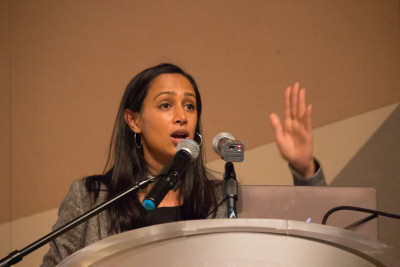
After Aaron and I welcomed the audience, the first speaker was a woman named Seema Sadanandan, who works with the Washington office of the ACLU. Her talk about what the drug war had done to blacks in Washington, D.C., was dynamic and informative. We couldn’t have had a better lead-off speaker.
Seema was followed by Radley Balko, who proceeded to give a dispassionate and fact-filled analysis of the drug war’s impact on African Americans. The audience was definitely transfixed, as it listened to this Washington Post columnist detailing how the drug war has adversely impacted people of color.
We then had a 15-minute video by a lawyer in Baltimore named Joseph Scalia, who recently had a great op-ed in the Baltimore Sun about the violence associated with the drug war.
At this point, we broke for lunch, providing everyone with a free box lunch and soft drink. We also had several students pass by the registration desk who inquired about the conference. Since we had some extra box lunches, we invited them to have lunch with us and many of them accepted our invitation.
The first speaker after lunch was a young African American woman named Kassandra Frederique, who works at the Drug Policy Alliance in New York. It is one of the leading organizations in the country opposing the drug war and had published many insightful articles on race and the drug war. Kassandra connected with the audience on a very personal level with her talk.
The final speaker was Neill Franklin, an African-American ex-Baltimore cop who now works for Law Enforcement Against Prohibition (LEAP), an organization of law-enforcement officers that calls for an end to the war on drugs. In the middle of his talk, Neill relayed to the audience how gratifying it was to be part of this conference at Morgan State and how he wished our program could be taken to other historically black universities in the country. 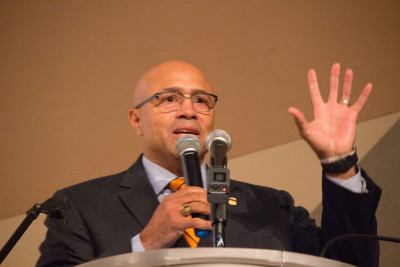
We then had a very lively Q&A session which entailed questions that the students had submitted in advance and some live questions.
We distributed to the attendees, as well as people who just stopped at the registration desk, a copy of our booklet “Economic Liberty and the Constitution” and a copy of our monthly journal Future of Freedom. We are also going to offer all the people who registered, including those who were unable to attend, a free one-year subscription to Future of Freedom.
The most amazing part of the conference was the synergy between the students and the speakers. At the end of the conference, the speakers hung around answering questions from the students. I asked each of the speakers whether they would be willing to do this again and the answer was an enthusiastic, “Yes, definitely.”
Three members of the Morgan State Pre-Law Association came up to us at the end of the conference and said, “Thank you so much for bringing this conference to Morgan.”
Of course, we are thankful for the opportunity of having this conference at Morgan and for the great work that the Pre-Law Association did to make it such a success. And we are also thankful for the financial support our donors have provided us that enabled us to do this.


